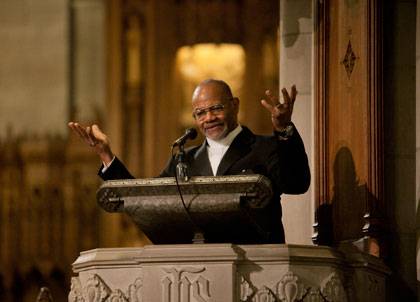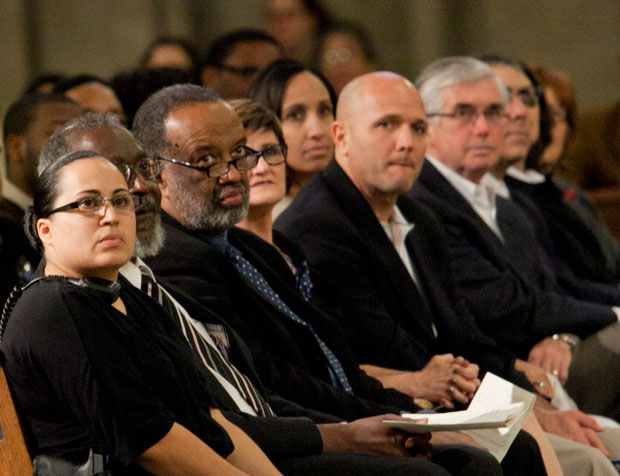
The theme of "Praise, Protest and Power: 50 Years in the Making" helped outline the Rev. William Turner's keynote address to a full audience in Duke Chapel Sunday afternoon. Turner drew from his own experience as a Duke student, Durham resident and member of the civil rights movement.
"I did not come to praise Duke in a manner that is uncritical," said Turner, a Divinity School professor and member of one of the earliest classes to integrate Duke. This year the university celebrates the 50th anniversary of the first African-American undergraduate students to integrate the university.
"Fifty years ago we were young people in the vortex of the tornado of change. Thank God we didn't know," Turner said to applause. "We were precocious, brash. And there were scars. Is it ok to tell the truth?
"Imagine what it is like to get caught on campus in the middle of the night and have someone say 'n--ger, let me see you run.'"
If caught on East Campus after the buses stopped running "only God and your feet could help you," he said.
"Some are no longer with us. Some are bitter to this very day. Some shun returning to this campus because of experiences that cut to the very core," he said of his peers.
He noted the progress the university has made, recognizing the upcoming commemoration of the first black students that will launch with a public reception Friday, Jan. 25, at the Nasher Museum of Art.
Yet Turner spoke of a time not too long ago when Duke and Durham were different places. Duke was a young institution compared to North Carolina College, now North Carolina Central University.
The university was split by gender with the Women's College on East Campus. At the time, downtown Durham had a vibrant black community with shops, department stores, movie theaters and hotels, he said.
"And if you walked a little and turned the corner, you were in another world, the world of Hayti," Turner remembered. "There was the pungent odor of tobacco, which was directly responsible for the empire that put the university on the map."
He said that 50 years ago, just 100 years after emancipation, scarcely 20 years removed from WW II, "history was pregnant with a moment that would reshape the landscape," and urged young people to "keep your eyes open. Time is doing its thing. What we take for granted now was in the realm of science fiction."
Turner's speech was preceded with remarks by President Richard H. Brodhead and Dr. Victor Dzau, chancellor of health affairs and CEO of Duke Hospital, both of whom gave credit to the power of the Durham community to effect change.
"I can't tell where Duke ends and Durham begins," Brodhead said of the chapel's audience.
Luke Powery, the first African-American dean of Duke Chapel, also spoke.
"It is said 11 a.m. [worship service] is the most segregated hour in the United States. Today at 3 p.m. we get a glimpse of the beloved community," he said.
Turner, a three-time Duke graduate and pastor of Mt. Level Missionary Baptist Church, has spent most of his academic and professional life at Duke. He said over the years he has grown comfortable in his own skin -- and in Duke blue.
"It is too late to be ashamed or apologetic," he said. "If you stay in a place long enough, it becomes home. You fix what you can. You do the best you can."
He described how protest, by students, faculty and administrators, such as the vigil following King's 1968 assassination, the 1969 Allen Building takeover and protests over gender inequity, have helped shape the campus climate for students of color and women.
"Fifty years ago we were in a pivotal space. The question for Duke, as for the nation, is how shall we emerge from juvenile status? Some days we're grown, some days we want to be petty," Turner said. "We have to decide whether we want to lead or lag. Shall we return to a painful past? Or shall we move into the future?"
Turner said the university is at a critical juncture and must accept the power it has to proceed, "even into the darkness," to new marks of achievement. It must build the strength of the student body, faculty and administration, and develop the physical campus as well as scholarships to offset student debt. The university has the ability, he said, to reflect the diverse region in which it is located.
Turner quoted from King's "I Have A Dream Speech," which is also in its 50th year.
"I'm not King, but I can see like King did, from this mountaintop, a glorious day... where crooked places will be made straight," Turner said.
Below: Nathaniel "Nat" White Jr., (third from left) one of the three surviving members of the first five African-American undergraduate students to attend Duke, listens to the service. Bottom, the NC Central Chorus performs. Photos by Megan Morr/Duke University Photography.

